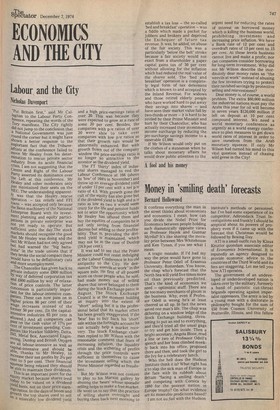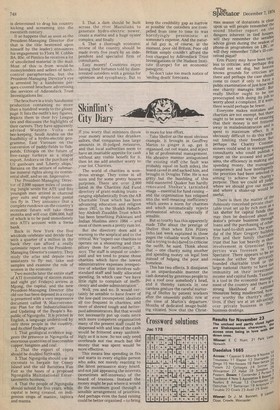A fool and his money
Money in 'smiling death' forecasts
Bernard Hollowoo d
It confirms everything the man in the street thinks about economists and economics. I mean, how can you divide the Nobel Prize for Economics between people holding such diametrically opposite views as Professor Hayek and Gunnar Myrdal? It's like sharing the morality prize between Mrs Whitehouse and Ken Tynan, if you see what I mean.
A tragic mistake. If I'd had my way the prize would have gone to Professor Peter Odell of Erasmus University, Rotterdam. You know, the chap who's forecast that the North Sea will yield five times more oil than previously predicted. That's the kind of economics we need — optimistic stuff. There are far too many merchants of gloom in the business. Why, even if Professor Odell is wrong he's at least cheered us all up. In fact the news saved one man's life. The chap was dithering on a window ledge of the Stock Exchange building, threatening to put an end to everything, and they'd tried all the usual gags to try and get him inside. Then a bright secretary, Angela Bloor, read a line or two of Professor Odell's speech and her boss climbed meekly back into his office, proposed there and then, and took the girl to the Ivy for a celebratory lunch. Who the hell does the Hudson Institute think it is? What right has it to slap the sick man of Europe in the face with its rubbish about Britain "facing a smiling death" and competing with Corsica by 1980 for the poorest nation in Europe trophy? On what evidence are its miserable predictions based?
I am not au fait with the Hudson Institute's methods or personnel, but I've had some experience of its competitor, Adirondack Trust Investigations and frankly I should be sceptical about its powers of prophecy even if it came up with the forecast that Christmas would be followed by Boxing Day.
ATI is a small outfit run by Klaus Knutter quondam associate editor of Economics International. It is reputedly an agency designed to provide economic advice to the countries of the Third World and its fees are staggering. Let me tell you how ATI operates.
The government of an undeveloped or underdeveloped nation is taken over by the military, formerly a band of patriotic cut-throat brigands operating against imperialist oppressors. The army is led by a young man with a doctorate in philosophy bought for the sum of £50 from Cosmos University of Prattsville, Illinois, and this fellow
is determined to drag his country kicking and screaming into the twentieth century.
It so happens that as soon as the President-Managing Director (for that is the title bestowed upon himself by the leader) announces his engagement to Flora M. Cobble BA, BSc, ofPimlico he receives a lot of unsolicited material in the mail. Most of this is from would-be moneylenders and sellers of birthcontrol paraphernalia, but the President-Managing Director's eye is arrested by a handsome per spex-covered brochure advertising the services of Adirondack Trust Investigations Inc.
The brochure is a truly handsome production containing no more than a hundred words to the glossy page. It lists the outfit's key figures, depicts them in their Ivy League ties and discusses the highlights of their careers. They have apparently advised Western Volta on bee-keeping, Saudi Arabia on the feasibility of a hydro-electric programme, East Vietnam on the conversion of paddy-fields to fishponds, Ethiopia on the future of free-range turkeys as a staple export, Andorra on the purchase of US gunboars and 'Liberty ships,' Barazea on the seizure of submarine mineral rights along its continental shelf, and so on. Impressive.
The President-Managing Director of 2,000 square miles of steaming jungle sends for ATI, and five youngish men attired in charcoal grey suits and single-tone pastel ties fly in. They announce that a complete rundown on the country's economic future will take three months and will cost £500,000, half of which is to be paid immediately into ATI's account with a Swiss bank.
Back in New York the five whizkids celebrate and decide that with a quarter of a million in the bank they can afford a really optimistic report on the PresidentManaging Director's country. They study the atlas and depute two assistants to fly out, take soil samples and examine the role of women in the economy.
Two months later the entire staff of AT! (consisting of sixteen males and eight girl Fridays) arrives in Mgong, the capital, and the new President-Managing Director (the old one has been deposed in a coup) is presented with a very impressive document called 'A Macroeconomic Plan for the Industrialisation and Updating of the People's Republic of Ngongolia.' It is printed in English, a language understood by only three people in the country, and its chief findings are: 1. That geological evidence suggests the presence in Ngongolia of enormous quantities of inaccessible copper, tungsten and coal.
2. That the export of copra should be doubled forthwith.
3. That Ngongolia should use its coconuts to bargain for Coney Island and the old Battersea Fun Fair as the bases of a proposed Ngongolia Multinational Entertainments business.
4. That the people of Ngongolia should subsist for five years, while capital is being created, on indigenous crops of manioc, tapioca and manna, 5. That a dam should be built across the river Mazuliana to generate hydro-electric power, create a marina and a huge oyster complex; and finally 6. That a thorough economic review of the country, should be made every five years by an independent and specialist firm of consultants.
Easy money! Countries enjoy having their fortunes told by disinterested outsiders with a genius for optimism and sycophancy. But to keep the credibility gap as narrow as possible the outsiders are compelled from time to time to wax horrifyingly pessimistic at someone's expense. And the natural fall guy is„ of course, at the moment, poor old Britain. Poor old Britain simply couldn't afford the fees charged by Adirondack Trust Investigations or the Hudson Institute (Europe) for an economic panegyric.
So don't take too much notice of 'smiling death' forecasts.



































 Previous page
Previous page